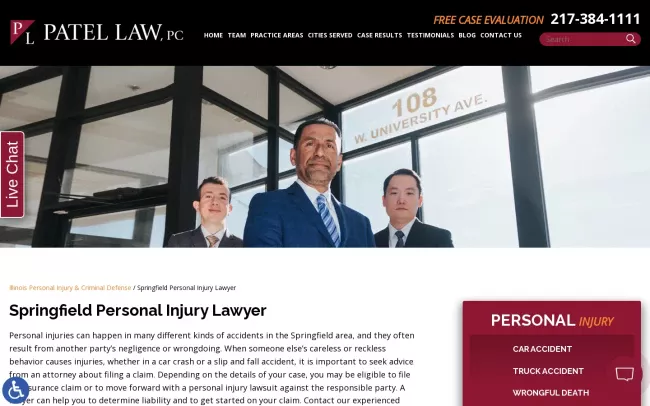
Patel Law, PC is a central Illinois personal injury firm with offices in Urbana, Springfield, Decatur, and Danville. Attorney Baku Patel brings nearly 30 years of trial experience to every case. He served as a Navy JAG officer and Federal Trade Commission prosecutor before becoming the youngest Chief Public Defender in Illinois at age 31.
The firm has recovered tens of millions of dollars for accident victims across the state. Their team includes attorney Jeffrey Kooi, who earned five consecutive Super Lawyers selections in plaintiff personal injury law. Patel Law handles car crashes, truck wrecks, wrongful death, and premises liability claims. Initial consultations cost nothing.
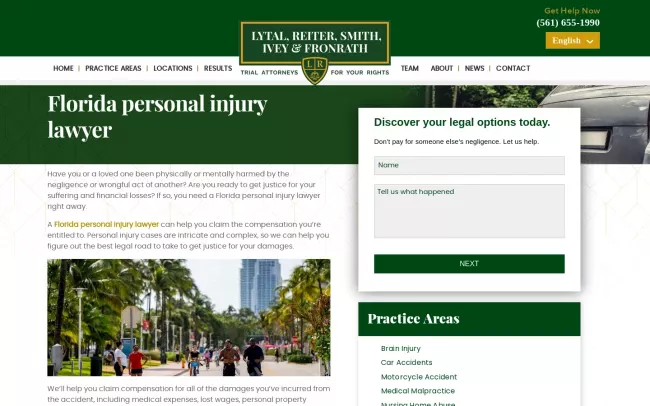
Lytal, Reiter, Smith, Ivey & Fronrath is a Florida personal injury law firm that has recovered over $2.5 billion since 1985. The West Palm Beach office leads a team of 24 trial attorneys supported by 18 paralegal investigators and two registered nurse paralegals.
Notable verdicts include $52 million in a Broward County case, $35.5 million for a wrongful death matter, and $100 million in a warehouse paralysis case. The firm handles brain injuries, medical malpractice, truck crashes, and nursing home abuse throughout Florida. They maintain seven offices from Melbourne to Fort Myers. Spanish-speaking staff available.
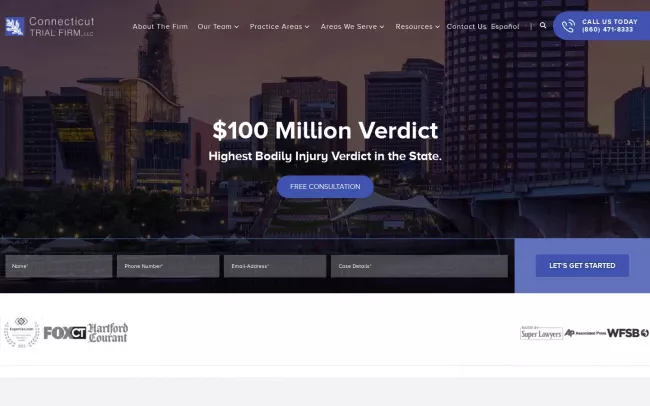
Claggett, Sykes & Garza are Connecticut trial lawyers who have secured over $1.5 billion in verdicts and settlements. The firm handles catastrophic injury cases that other attorneys turn away.
Their trial record speaks for itself:
- $485 million for a foster care sexual assault case,
- $153 million for a product defect wrongful death,
- and $100 million for a warehouse paralysis victim.
Partners Sean Claggett, Will Sykes, and Andrew Garza train thousands of lawyers nationwide in trial techniques. They take cases on a contingency basis with no fees unless they win.
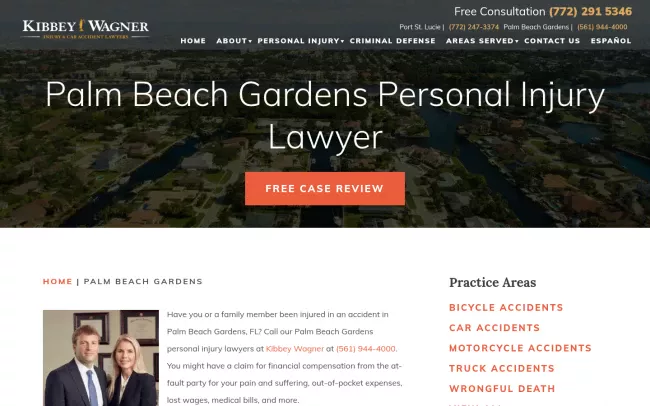
Kibbey Wagner is a South Florida personal injury firm with over 80 years of combined experience among its attorneys. The Palm Beach Gardens team has recovered more than $500 million for clients throughout the region.
Founding attorney Jordan B. Wagner holds Board Certification in Civil Trial Law and previously worked as an insurance defense lawyer. This background gives the firm insight into how insurers evaluate claims. Recent results include a $2.25 million auto accident settlement and $1.75 million premises liability recovery. The firm earned Top 100 Trial Lawyers recognition and 10/10 Avvo ratings. Case reviews are free, and clients pay nothing unless they win.
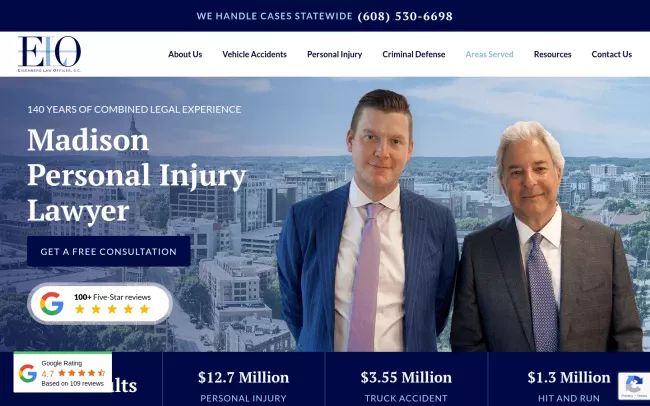
Eisenberg Law Offices is a Madison personal injury firm serving Wisconsin since 1983. The team brings 140 years of combined legal experience and has recovered over $100 million for accident victims.
Attorney Stephen Eisenberg earned an AV Preeminent rating, National Trial Lawyers Top 100 selection, and recognition in the Nation's Top One Percent. Notable results include a $12.7 million jury verdict against St. Mary's Hospital in a paralysis case and a $3.55 million wrongful death settlement. The firm was voted Best of Madison 2024. Free case evaluations available.

Massey & Associates is a Chattanooga personal injury law firm focused on car accidents, truck crashes, and premises liability claims. The Tennessee attorneys work directly with clients from the first meeting through resolution.
The firm offers 24/7 availability for accident victims who need immediate legal guidance. They handle cases on a contingency fee basis throughout southeast Tennessee and north Georgia.
Latest Blog Posts
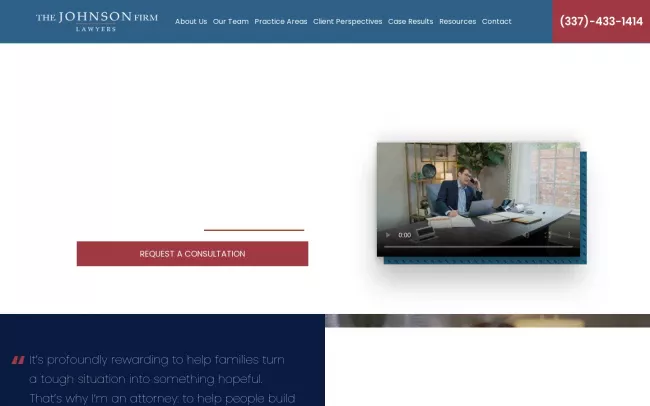
The Johnson Firm is a Lake Charles law practice serving southwest Louisiana since 1980. Their attorneys handle personal injury claims, criminal defense matters, and family law disputes across Calcasieu Parish and surrounding areas.
The firm provides free initial consultations for accident victims seeking compensation for medical bills, lost wages, and pain and suffering.
Latest Blog Posts
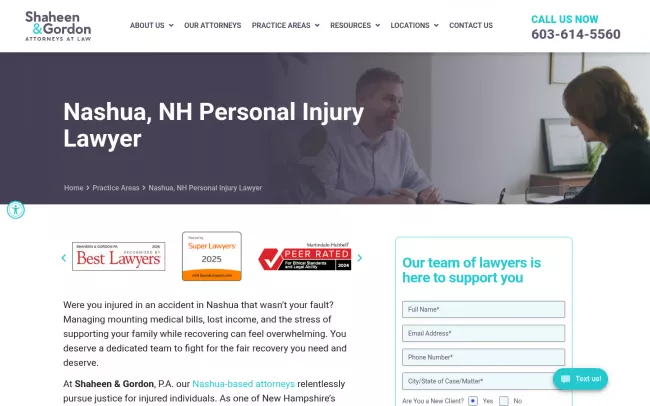
Shaheen & Gordon, P.A. represents injured clients as a leading Nashua, NH personal injury law firm. The team handles car accidents, truck crashes, wrongful death, and slip-and-fall cases. Multiple attorneys are recognized by Super Lawyers® and hold Martindale-Hubbell AV Preeminent ratings.
Founded in 1981, the firm has recovered millions for clients, including a $2 million wrongful death settlement in Nashua. Spanish-speaking staff and virtual appointments are available. Free consultations are on a contingency-fee basis—no fee unless you win.
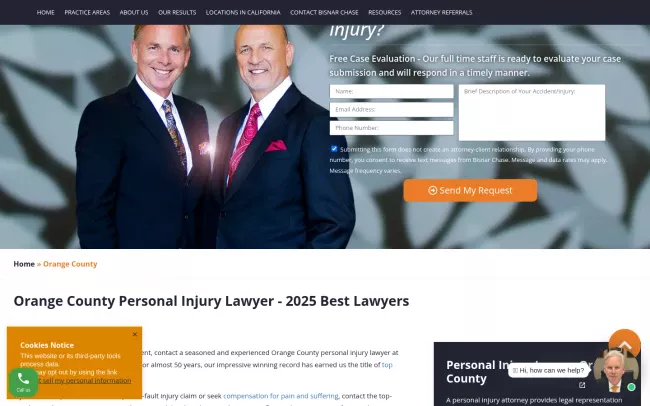
Bisnar Chase is an Orange County personal injury firm that has won over $1 billion for clients since 1978. The team maintains a 99% success rate across more than 12,000 cases.
Managing partner Brian Chase leads the firm's auto defect and product liability practice. He earned 2026 Super Lawyers recognition, Top 100 Attorneys status, and Lawyer of the Year honors from Best Lawyers. Bisnar Chase handles car crashes, pedestrian accidents, dog bites, and defective product claims throughout Southern California. They advance all case costs and collect no fee unless they win.
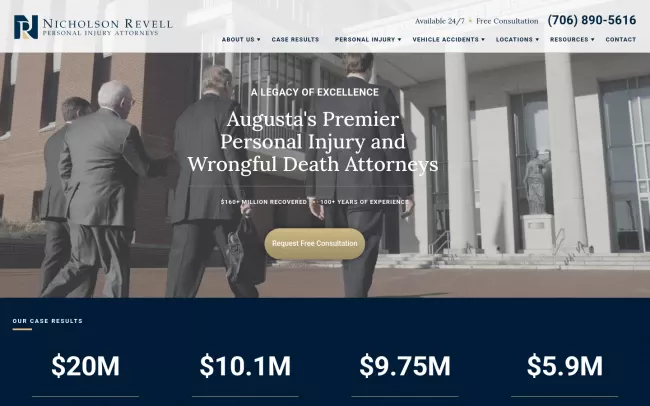
Nicholson Revell is an Augusta personal injury firm with an AV Preeminent rating from Martindale-Hubbell. The Georgia attorneys have recovered over $140 million for accident victims across the CSRA.
The firm handles car wrecks, wrongful death claims, and medical malpractice cases. Free consultations available at (706) 722-8784.
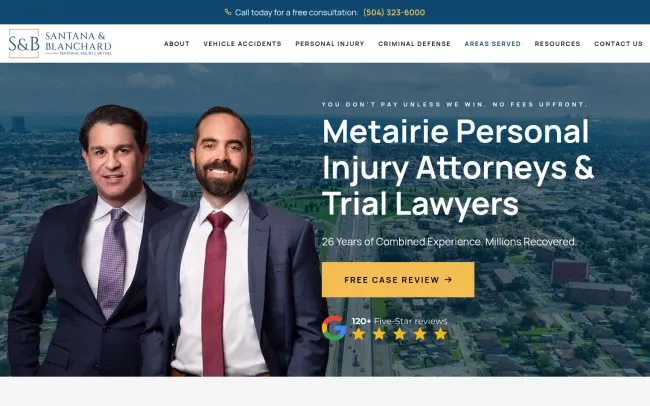
Santana & Blanchard are Metairie personal injury attorneys serving the greater New Orleans area. The Louisiana lawyers bring decades of combined courtroom experience to accident and criminal defense cases.
Clients work directly with their attorneys throughout the legal process. The firm emphasizes clear communication and accessibility for injured victims seeking compensation.

Brandon J. Broderick is a New Jersey injury law firm that has recovered over $500 million in settlements and verdicts. The practice serves clients across New Jersey, New York, Connecticut, and Florida from multiple office locations.
The legal team includes a Certified Civil Trial Attorney recognized by the New Jersey Supreme Court. They handle car crashes, truck wrecks, construction accidents, slip and falls, and workers' compensation claims. The firm offers 24/7 availability and works on contingency—you pay nothing upfront.
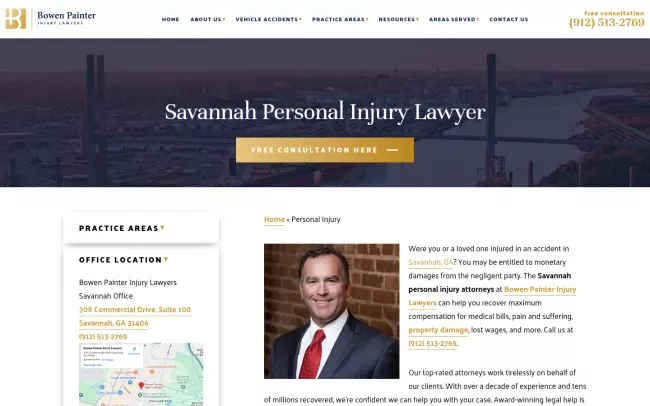
Bowen Painter is a Savannah personal injury firm with a 95% success rate and an $18 million record verdict. The Georgia attorneys handle car crashes, truck wrecks, and maritime accidents throughout the coastal region.
The firm provides free consultations around the clock at (912) 335-1909. Clients pay no fees unless they recover compensation.
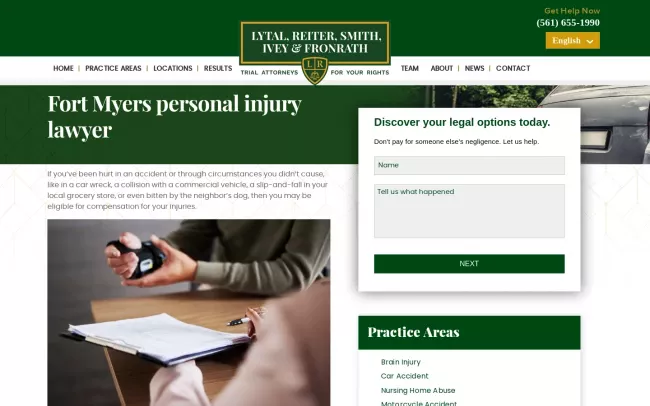
The Fort Myers office of Lytal, Reiter, Smith, Ivey & Fronrath serves accident victims across Southwest Florida. The firm has recovered over $2.5 billion statewide since 1985.
Their experienced trial attorneys handle car crashes, medical malpractice, and wrongful death claims in Lee, Collier, and Charlotte counties. Free case evaluations available.
Latest Blog Posts
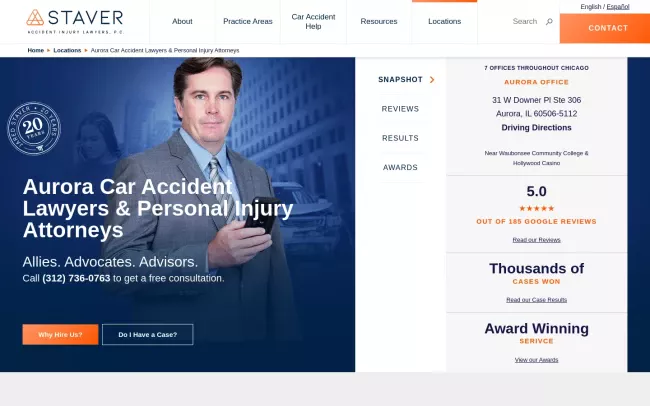
Staver Accident Injury Lawyers, P.C. - Aurora Office
https://www.chicagolawyer.com/locations/aurora/Staver Accident Injury Lawyers operates an Aurora office serving Kane County and the western Chicago suburbs. The Illinois injury attorneys have recovered millions for crash victims throughout the region.
The firm provides 24/7 support for accident emergencies. Clients owe no fees unless they secure compensation for their injuries.
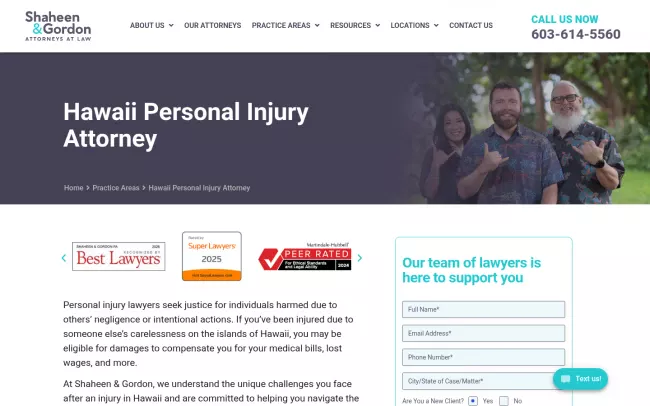
Shaheen & Gordon, P.A. is a Hawaii personal injury law firm with offices in Honolulu, serving clients across all islands. Founded in 1981, this Best Lawyers®-recognized firm has recovered millions for injury victims, including a $15 million truck accident verdict.
Their Hawaii personal injury attorneys handle car accidents, wrongful death, ocean-related injuries, slip-and-falls, and workplace claims. The team works on a contingency fee basis — no fees unless they win. Call (808) 730-1875 for a free consultation.
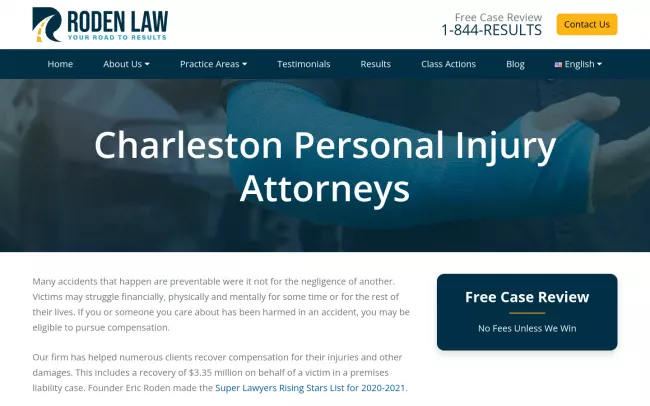
Roden Law is a Charleston personal injury firm with a track record of million-dollar recoveries for South Carolina accident victims. The attorneys handle car crashes, truck wrecks, and premises liability claims on a contingency fee basis.
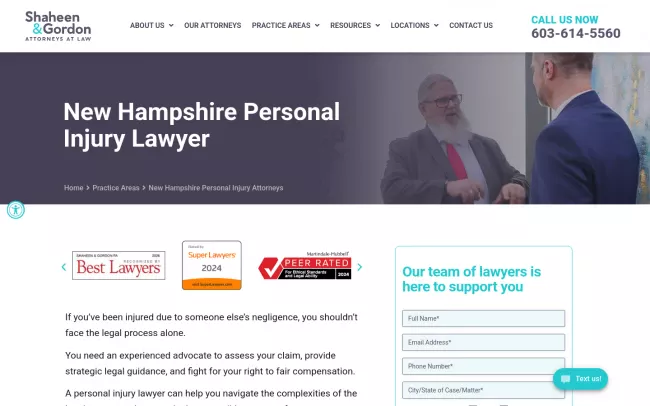
Shaheen & Gordon is a New Hampshire personal injury firm with over 40 years of experience serving the Granite State. The Concord attorneys handle car crashes, truck wrecks, and workplace injuries across all New Hampshire counties.
Free consultations available. No fees unless they secure compensation for your injuries.
Latest Blog Posts
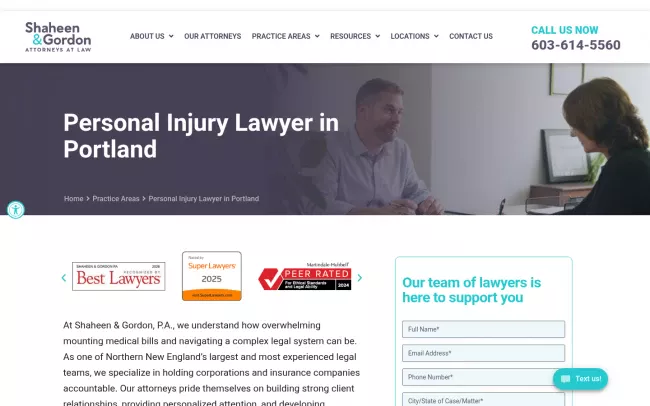
Shaheen & Gordon is a Portland injury firm ranked among the Best Law Firms in America. The Maine office features more than 50 attorneys who have secured verdicts exceeding $15 million.
The firm handles car crashes, truck accidents, and medical malpractice throughout southern Maine. Free case reviews with no fee unless you win.
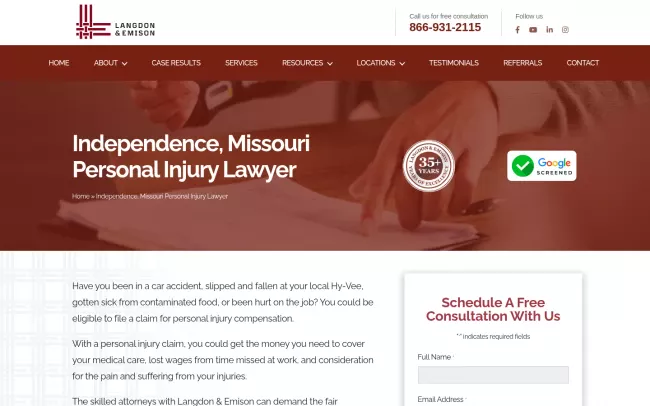
Langdon & Emison is an Independence personal injury firm serving the Kansas City metro. The Missouri attorneys represent accident victims in car crashes, slip and falls, and workplace injury claims.
Free consultations help injured clients understand their legal options and potential compensation.
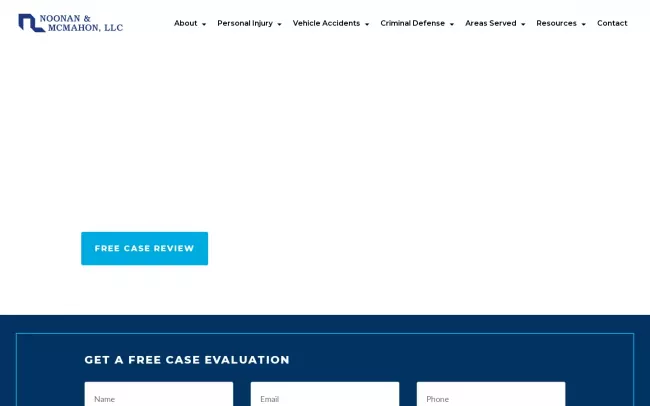
Noonan & McMahon is a Freehold personal injury firm with over 40 years of combined experience. The New Jersey attorneys have recovered millions for clients throughout Monmouth County and central New Jersey.
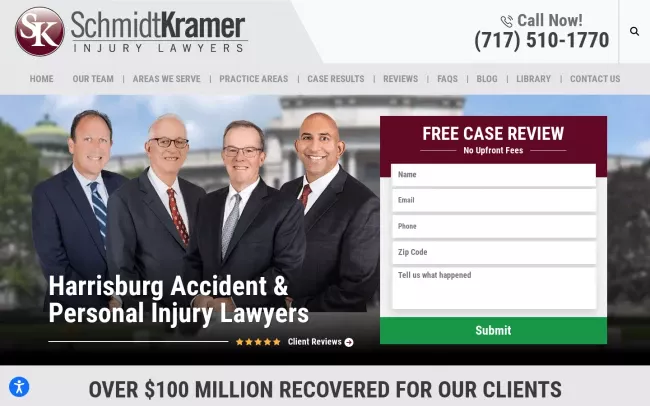
Schmidt Kramer is a Harrisburg personal injury firm with over 30 years of experience serving central Pennsylvania. Notable verdicts include recoveries exceeding $10 million for catastrophic injury victims.
The firm offers free case reviews for car crashes, truck accidents, and medical malpractice claims.

Galloway Jefcoat is a Lake Charles personal injury firm that has recovered millions for Louisiana accident victims. The attorneys handle car crashes, truck wrecks, and oilfield injuries throughout southwest Louisiana.
Free consultations with no upfront fees for injury claims.
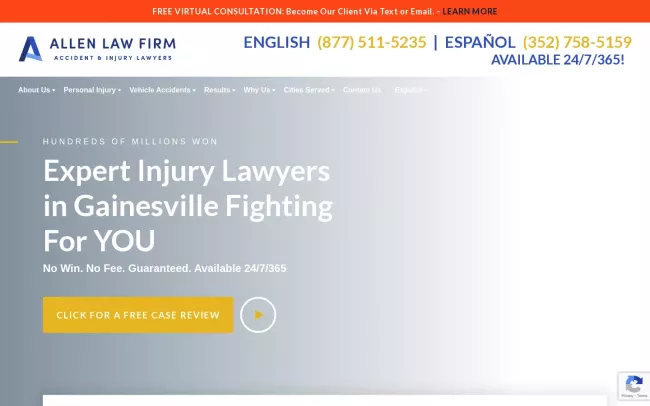
Allen Law is a Gainesville personal injury firm that has recovered millions for Florida accident victims since 2007. The attorneys earned Top 100 Lawyers recognition for their work against insurance companies.
The firm handles car crashes, motorcycle wrecks, and slip and fall claims throughout north-central Florida.
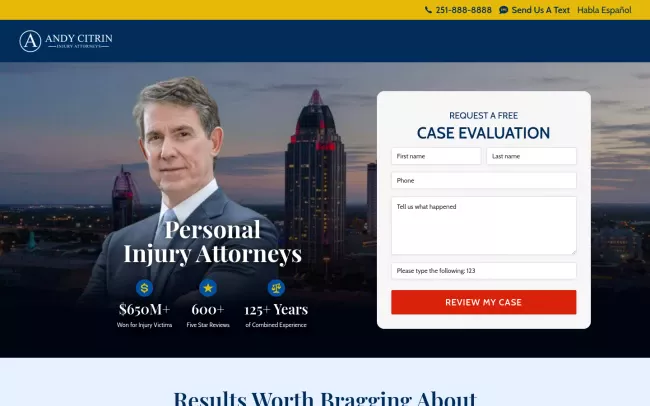
Andy Citrin Injury Attorneys is a Mobile personal injury firm that has recovered over $650 million for clients across Alabama and Mississippi. Founder Andy Citrin holds Board Certification as a Civil Trial Advocate and maintains an AV Preeminent rating spanning 25 years.
The firm earned Top 100 Trial Lawyers in Alabama recognition and operates five offices across both states. Recent results include an $8.5 million distracted driving settlement and a $6 million truck accident verdict. Their in-house mock courtroom helps prepare clients for trial. Free consultations with no upfront fees.
Latest Blog Posts
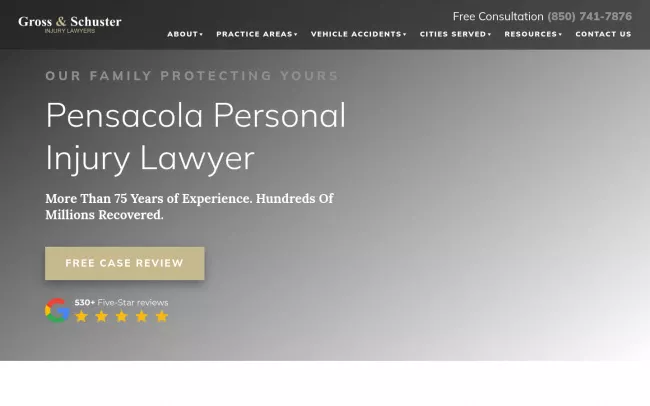
Gross & Schuster are Pensacola injury lawyers serving Northwest Florida since 1981. The firm features board-certified attorneys with 75 years of combined experience and over $200 million recovered. Five Florida office locations. Call (850) 434-3333.
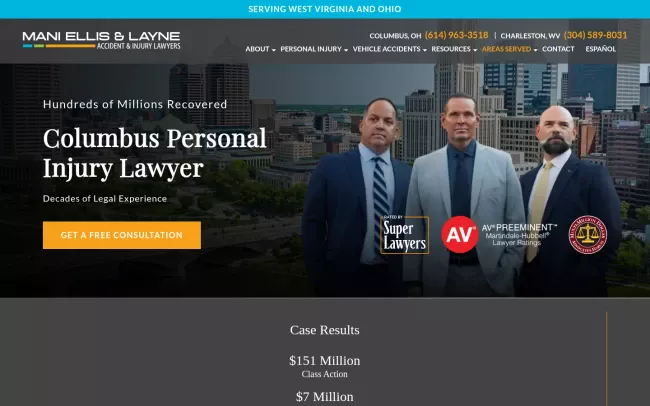
Mani Ellis & Layne is a Columbus personal injury firm with an AV Preeminent rating. The Ohio attorneys have recovered millions for accident victims throughout Franklin County.
Free consultations at (614) 924-8060. No fees unless they win your case.

Christina Pendleton & Associates is a woman-owned Richmond personal injury firm delivering strong results for Virginia accident victims. The attorneys handle car crashes, truck wrecks, and premises liability claims throughout central Virginia.
Free consultation at (804) 250-5050.
Latest Blog Posts
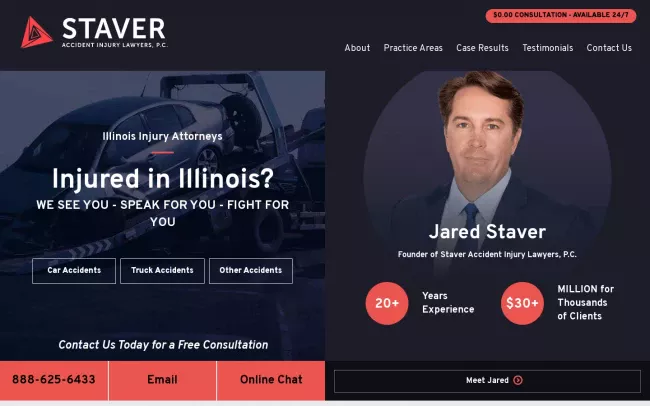
Staver Accident Injury Lawyers maintains a Springfield office serving central Illinois. The firm earned 2024 Super Lawyers recognition and has recovered over $30 million for accident victims.
Free consultations. No fee unless you win.

Belt, Bruner & Barnett are Birmingham personal injury attorneys with over 90 years of combined experience. The Alabama lawyers handle car crashes, truck wrecks, and wrongful death claims throughout the state.
Free consultations help injured victims understand their options for compensation.
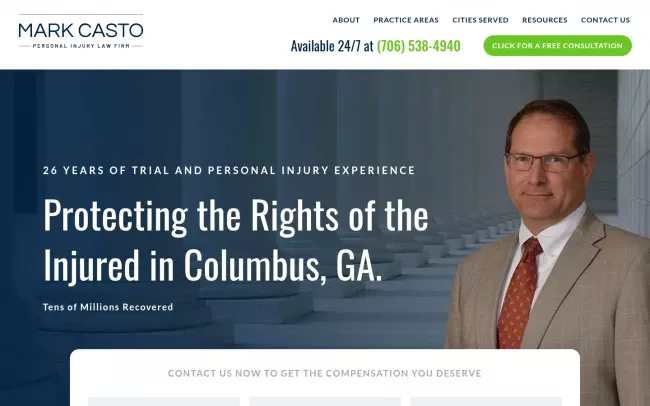
Mark Casto Personal Injury Law Firm represents accident victims in Columbus, GA. Attorney Mark Casto is a Georgia Super Lawyers honoree and Top 100 Trial Lawyer with 26+ years of courtroom experience. The team has recovered tens of millions for injured clients. Practice areas include car accidents, truck crashes, motorcycle injuries, wrongful death, and workers' compensation. Free consultations available. Call (706) 708-0589.

Slepkow Law is an East Providence firm with over 90 years of combined legal service to Rhode Island families. The attorneys handle personal injury claims, divorce proceedings, and estate planning matters.
Attorney David Slepkow provides direct representation on accident cases.
Latest Blog Posts

Farmer, Cline & Campbell Personal Injury Lawyers represents injured clients throughout Morgantown and Monongalia County. Founded in 1996, the firm has recovered over $500 million for West Virginia accident victims. Their attorneys hold Super Lawyers recognition and Martindale-Hubbell's AV Preeminent rating. The team handles car accidents, truck crashes, motorcycle collisions, wrongful death, workplace injuries, slip and fall cases, and medical malpractice claims. Free consultations available at their Suncrest Towne Centre office. Contingency fees mean clients pay nothing unless they win.

The Hernia Mesh Lawsuit Attorney is a Rhode Island practice handling defective medical device cases nationwide. Attorney David Slepkow represents patients who suffered complications from hernia mesh implants.
Free evaluations for mesh injury claims.
Latest Blog Posts
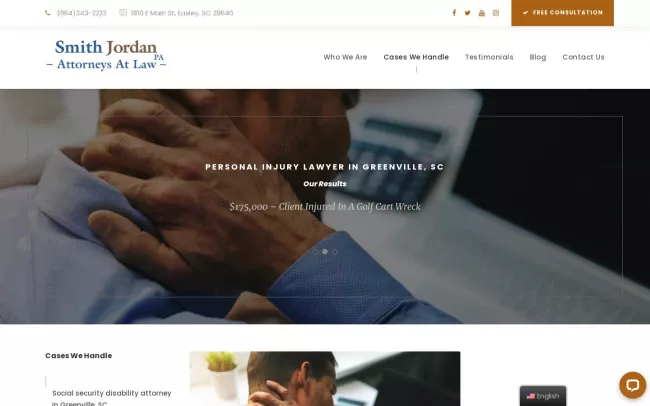
Smith Jordan is a Greenville area personal injury firm with over 50 years of experience in the South Carolina Upstate. The attorneys handle car crashes, truck wrecks, and workplace injuries. Spanish-speaking staff available.
Latest Blog Posts
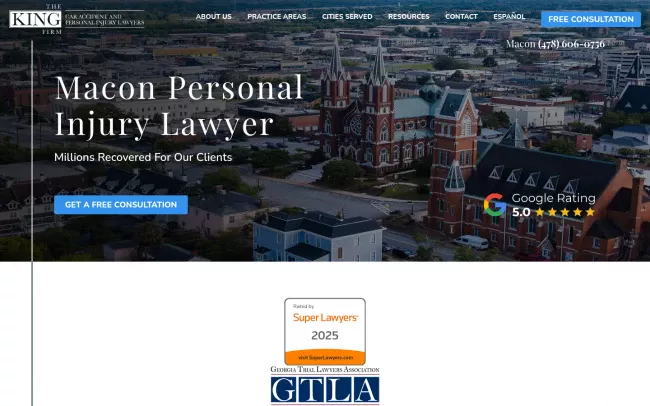
The King Firm is a Macon personal injury practice that has recovered $50 million for Georgia accident victims. The attorneys handle child injuries, agricultural accidents, and wrongful death claims. Call (229) 386-1376.
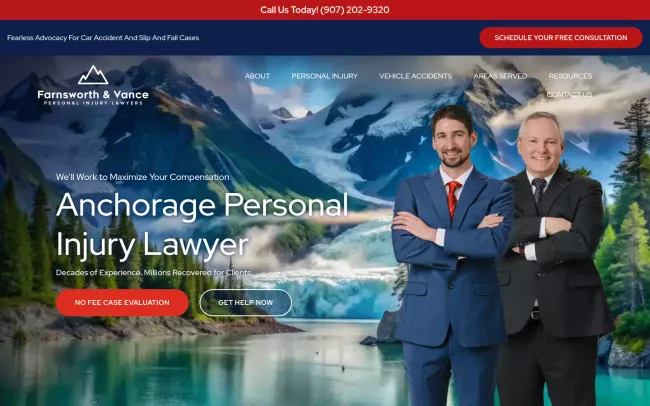
Farnsworth & Vance are Anchorage personal injury lawyers handling car crashes, medical malpractice, and wrongful death claims across Alaska. Free consultations. No fees unless you win.
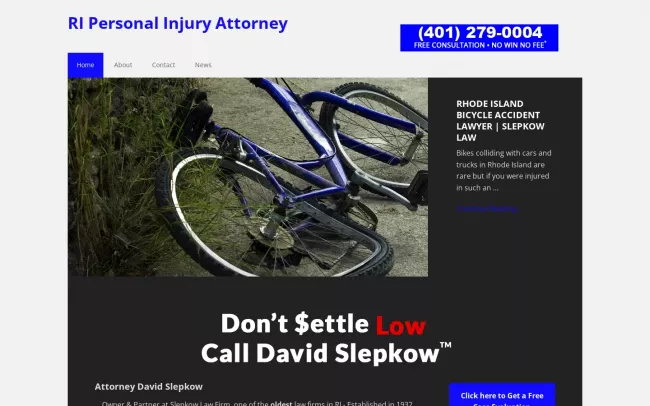
David Slepkow is a Rhode Island injury attorney with over 20 years of experience representing accident victims. He provides direct attorney access throughout your case on a no-win, no-fee basis.
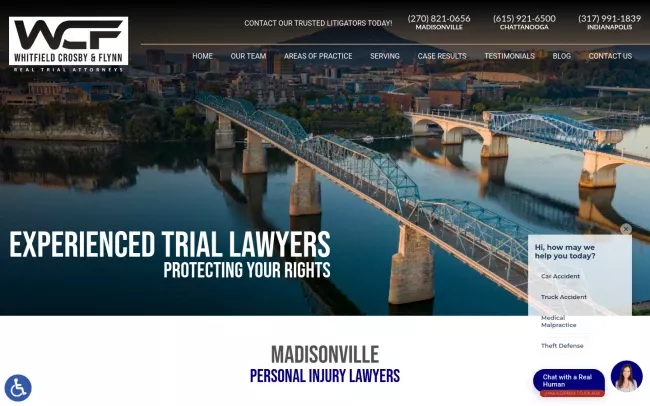
Whitfield Crosby & Flynn are Madisonville personal injury attorneys serving western Kentucky. The firm handles car crashes, truck wrecks, and negligence claims. Free consultations for injured victims.

Slepkow Law handles defective product cases from its Rhode Island office. Attorney David Slepkow brings courtroom victories and industry recognition to consumer protection claims.
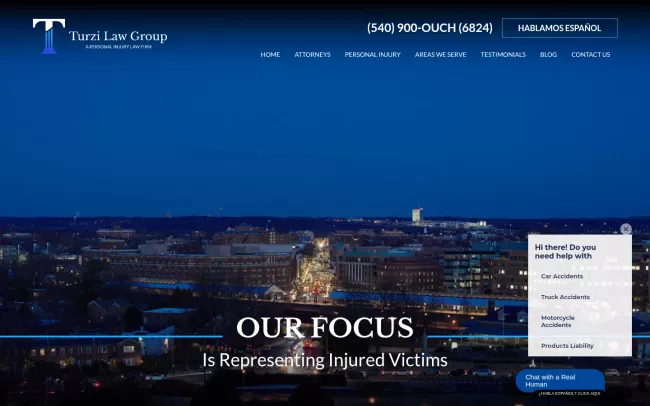
Turzi Law Group is a personal injury law firm serving Manassas, Alexandria, Northern Virginia, Maryland, and Washington, D.C. We represent individuals and families harmed by negligence, accidents, and abuse of power. Our practice includes car, truck, motorcycle, pedestrian, bicycle, rideshare, and scooter accidents, as well as premises liability, wrongful death, workers’ compensation, and serious injury claims. We also handle complex matters involving burn injuries, transportation accidents, and online exploitation. Our attorneys focus on strategic advocacy, clear communication, and real results. We work on a contingency fee basis—no upfront costs, no fees unless we win. Free consultations available.
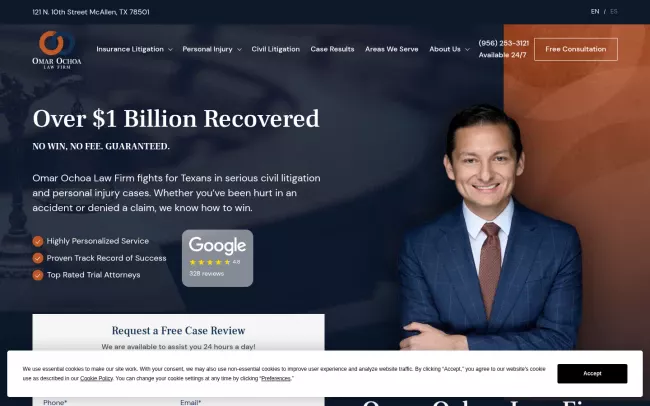
Omar Ochoa Law Firm is a McAllen personal injury practice that has helped recover over $1 billion for Texas accident victims. The attorneys earned 2025 Super Lawyers recognition. Se habla español. Free consultations available 24/7.